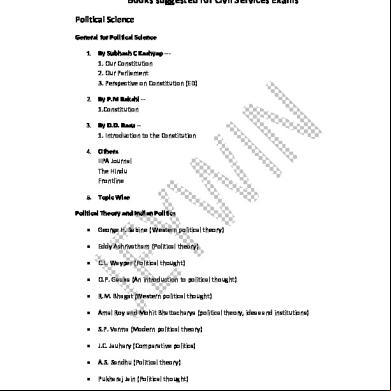Anthropology, Sociology, Political Science 3f5o4x
This document was ed by and they confirmed that they have the permission to share it. If you are author or own the copyright of this book, please report to us by using this report form. Report 2z6p3t
Overview 5o1f4z
& View Anthropology, Sociology, Political Science as PDF for free.
More details 6z3438
- Words: 328
- Pages: 1
Mariefher Grace Z. Villanueva Subject: Understanding Culture, Society, & Politics
STEM1-D
ANTHROPOLOGY DEFINITION It is the systematic study of the biological, cultural, and social aspects of man. Derived from two Greek words, Anthropos, which means “man”, and logos, which means “study” or “inquiry”
GOALS Integrates elements from biological sciences and humanities to fully comprehend the complex human species, including their past practices and social patterns, across diverse cultures.
PROPONENT(S) Edward Burnett Taylor Franz Boas Alfred Kroeber Bronislaw Malinowski Clifford Geertz Margaret Mead
PROPONENT(S) August Comte Herbert Spencer Karl Marx Emile Durkheim Max Weber
SOCIOLOGY DEFINITION The study of human social life, groups, and society. (Giddens, 1989) The science of society, social institutions, and social relationships; specifically: the systematic study of the development, structure, interaction, and collective behavior of organized groups of human beings.
GOALS To provide a deeper assessment of individual and group behavior, as well as social phenomena, by examining the interplay between economic, political, and social factors. Seeks to explain the bases of social order and social change. Improvements in social policy and welfare.
POLITICAL SCIENCE DEFINITION The systematic study of politics, which Andrew Heywood describes as, “the activity through which people make, preserve, and amend the general rules under which they live. Focuses on the fundamental values of equality, freedom, and justice and its processes are linked to the dynamics of conflict, resolution, and cooperation.
UCSP: ASSIGNMENT
GOALS To understand the nature and characteristics of authority and power distribution and how it shapes the way society is organized. To analyze wide array of topics including systems of governance, political theories, the lawmaking process, political behavior and ethics, policies and their implications, political organization, and the electoral process.
PROPONENT(S)
Plato Aristotle Niccolò Machiavelli Jean Jacques Rousseau Baron de Montesquieu Thomas Hobbes John Locke Karl Marx
STEM1-D
ANTHROPOLOGY DEFINITION It is the systematic study of the biological, cultural, and social aspects of man. Derived from two Greek words, Anthropos, which means “man”, and logos, which means “study” or “inquiry”
GOALS Integrates elements from biological sciences and humanities to fully comprehend the complex human species, including their past practices and social patterns, across diverse cultures.
PROPONENT(S) Edward Burnett Taylor Franz Boas Alfred Kroeber Bronislaw Malinowski Clifford Geertz Margaret Mead
PROPONENT(S) August Comte Herbert Spencer Karl Marx Emile Durkheim Max Weber
SOCIOLOGY DEFINITION The study of human social life, groups, and society. (Giddens, 1989) The science of society, social institutions, and social relationships; specifically: the systematic study of the development, structure, interaction, and collective behavior of organized groups of human beings.
GOALS To provide a deeper assessment of individual and group behavior, as well as social phenomena, by examining the interplay between economic, political, and social factors. Seeks to explain the bases of social order and social change. Improvements in social policy and welfare.
POLITICAL SCIENCE DEFINITION The systematic study of politics, which Andrew Heywood describes as, “the activity through which people make, preserve, and amend the general rules under which they live. Focuses on the fundamental values of equality, freedom, and justice and its processes are linked to the dynamics of conflict, resolution, and cooperation.
UCSP: ASSIGNMENT
GOALS To understand the nature and characteristics of authority and power distribution and how it shapes the way society is organized. To analyze wide array of topics including systems of governance, political theories, the lawmaking process, political behavior and ethics, policies and their implications, political organization, and the electoral process.
PROPONENT(S)
Plato Aristotle Niccolò Machiavelli Jean Jacques Rousseau Baron de Montesquieu Thomas Hobbes John Locke Karl Marx







